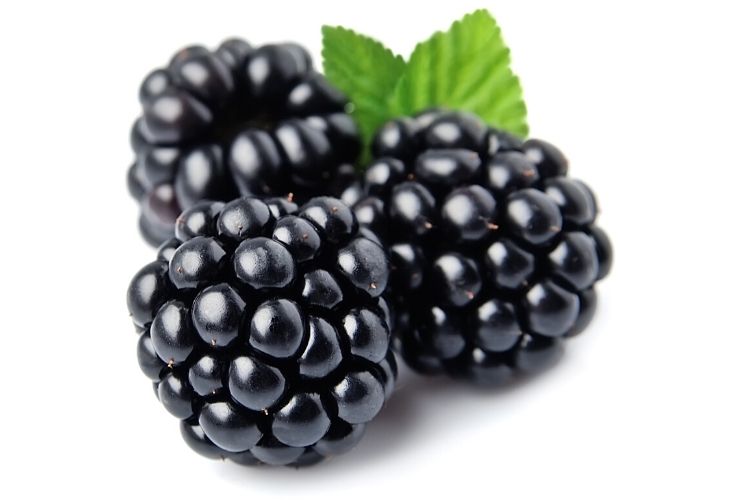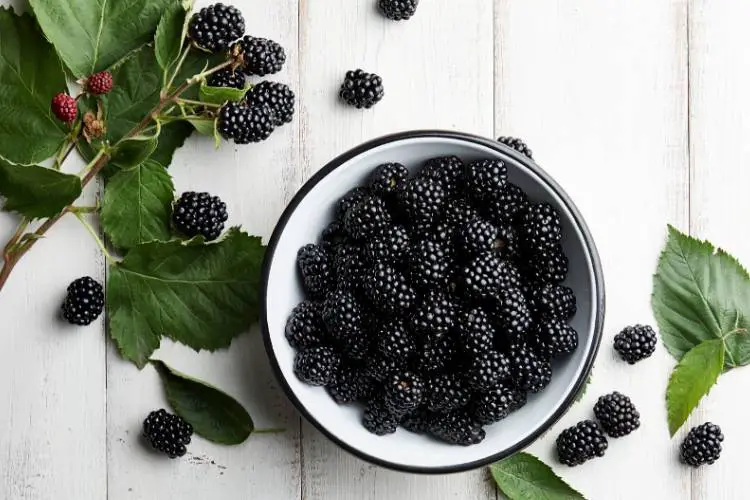
Whether you add them to your smoothie, yogurt parfait, or salads, blackberries are a versatile and easy way to add nourishment to a balanced diet. These sweet, dark berries also taste amazing pureed into a coulis and used as a topping for ice cream and desserts.
Blackberries are often touted as a superfood because of their potent antioxidant profile. This fruit is packed with vitamins, minerals and fiber, yet low in calories, carbs, and fat.
Blackberries make the perfect snack for most diets, even Keto. So, keep reading to find out how incorporating blackberries into your meal plan can boost your overall health and vitality.
Are Blackberries Keto Friendly?
Blackberries are an excellent fruit to satisfy your sweet tooth if you’re following a low-carb diet. A half-cup serving contains a mere 3.1 grams of net carbs. Whether you snack on them raw or throw them into a recipe, blackberries make a great addition to your keto meal plan.
How Many Carbs are in Blackberries?
A 100-gram serving of fresh blackberries contains 5 grams of net carbs. There are 10 grams of net carbs in this serving size; however once the 5 grams of fiber are accounted for, the total net carbs decrease to just 5 grams.
How Many Calories are in Blackberries?
A 100-gram serving of blackberries contains only 43 calories. Blackberries are a great low-calorie way to add extra nutrients, flavor and fiber to your smoothies or yogurt.
Nutrition Facts
| Serving: 100 grams of Blackberries | |
| Calories 43 | |
| Total Fat 0.5 grams | 0% |
| Saturated fat 0 grams | 0% |
| Polyunsaturated fat 0.3 grams | |
| Monounsaturated fat 0 grams | |
| Cholesterol 0 milligrams | 0% |
| Sodium 1 milligrams | 0% |
| Potassium 162 milligrams | 4% |
| Total Carbohydrate 10 grams | 3% |
| Dietary fiber 5 grams | 20% |
| Sugar 4.9 grams | |
| Protein 1.4 grams | 2% |
| Vitamin A | 4% | Vitamin C | 35% |
| Calcium | 2% | Iron | 3% |
| Vitamin D | 0% | Vitamin B-6 | 0% |
| Cobalamin | 0% | Magnesium | 5% |
Health Benefits
Provides Vital Nutrients
Blackberries are packed with nutrients, such as vitamins A C, K, iron, calcium, magnesium and manganese.
Just one cup of blackberries contains half the daily recommended value of vitamin C. Vitamin C is vital to the formation of bones, connective tissue, and blood vessels. It also assists in wound healing and skin regeneration. This important vitamin also acts as an antioxidant to combat free radicals in the body and aids in iron absorption. Additionally, it fights off the common cold and wards off diseases like scurvy.
Vitamin K also helps your body heal wounds as it allows your blood clot. Vitamin K is also a key nutrient utilized by the body for bone metabolism. Individuals who have a vitamin K deficiency may experience more fractures as a result of bone thinning.
Manganese is associated with the prevention of osteoporosis. It also helps your body manage blood sugar levels and metabolize carbs. Like vitamin C, manganese plays a key role in the formation of collagen.

High in Fiber
Blackberries are full of fiber to support digestive health to promote regular bowel movements. In fact, half of their carbohydrates come from fiber. A diet high in fiber is also associated with heart health because it helps reduce cholesterol levels. Fiber also helps you control your blood sugar levels by slowing the rate at which sugar is absorbed by the blood.
Alternatively, low-fiber diets have been linked to digestive problems like bloating, constipation, and stomach pain.
Supports Brain Health
Eating blackberries regularly improves the health of your brain by preventing age-related memory loss, according to the Journal of Agricultural and Food Chemistry. It was found that antioxidants in berries like blackberries help fight free radicals that alter how the brain’s neurons function. Blackberries fight inflammation in the brain that can lead to cognitive and motor issues as we age.
Promotes Oral Health
According to a 2013 study conducted by the College of Dentistry at the University of Kentucky, you should add blackberries to your daily dental regimen. The study found blackberry extract provided antibacterial and anti-inflammatory properties against the type of bacteria that causes oral disease. Although more research is needed, the extract of blackberries is a promising treatment in the prevention of gum disease and cavities.
Benefits for Skin and Hair
According to the book Healing Foods, blackberries are a great source of an antioxidant called ellagic acid, which prevents skin damage from over-exposure to the sun. Ellagic acid also helps the body breakdown collagen to improve the firmness of the skin and reduce inflammation.
Blackberries are made up of over 85% water and half of their carb-content comes from fiber. Fiber-rich, hydrating fruits, like blackberries have detoxifying benefits for your skin. The water content improves the moisture and elasticity of your skin. The vitamins A and C present in blackberries also have the power to rejuvenate skin; while vitamin K synthesizes collagen and helps heal wounds and scars.
But that’s not all. Blackberries also work wonders for the hair. The antioxidants help fight off the damaging effects of the environment on the hair. In fact, applying mashed blackberries to the hair can add volume and shine.
Side Effects
Blackberries are safe to consume and unlikely to cause side effects in people without an allergy to them.
Choosing fresh blackberries or frozen blackberries is preferable over raspberry products like purees or pie fillings that contain added sugar. Canned blackberries may also contain added sugar or preservatives linked to negative side effects on long-term health.
Related Questions:

When are Blackberries in Season?
Blackberries grow and ripen from late spring to early fall. Peak season in the United States runs from July to August, with the harvest beginning earlier in Southern states (where the climate is warmer) and nearer to autumn in the Northwest.
What is the Best Way to Store Blackberries?
Store blackberries in a shallow container inside the refrigerator immediately after picking. Fresh blackberries are quite perishable, so they should be eaten (or frozen) within a few days after they’ve been picked.
Are Blackberries Safe for Diabetics?
The fiber in blackberries helps you control your blood sugar levels by slowing the rate of sugar absorption.
Blackberries have a low Glycemic Index (GI), coming in at 25 so they don’t have much of an impact your blood glucose response. A rating of 55 or lower won’t likely spike blood sugar levels. The Glycemic load is ranked a 4, which is exceptionally low; however, people with diabetes should avoid eating too many servings of raspberries in order to keep blood sugar levels stable. Better yet, pair your raspberries with protein, like a handful of nuts, a serving of Greek yogurt or a slice of cheese. This will help slow the digestion of carbohydrates and the absorption of fruit sugar (fructose) by the blood.
Are Blackberries Good for Weight Loss?
One cup of raw blackberries has only 62 calories, 1 gram of fat, and only 7 grams of net carbs, which makes them an excellent addition to any healthy eating plan. These berries are a great snack for weight loss because they contain a hefty dose of fiber to help you feel satiated in between meals, which prevents overeating.
Moreover, fibre nourishes healthy gut bacteria, improves digestion and promotes healthy bowel movements, which can also be of benefit for those on a weight-loss program.
Are Blackberries Acidic or Alkaline?
Blackberries fall at around 3.12 to 3.33 on the pH scale, which means they are an acidic food. You should avoid acidic foods if you have acid reflux or heartburn as these foods may loosen the muscle between the stomach and the esophagus.
Other healthy fruits such as strawberries, raspberries, and blueberries are very acidic as well. With that being said, healthy foods such as these that happen to be acidic can be neutralized by combining them with more alkaline (less acidic) foods. For example, berries become safer for people with acid reflux if you consume them with unsweetened almond milk. The alkaline almond milk will buffer the acidity in the berries.
You might also wish to squeeze lemon juice over your berries, as lemon becomes alkaline once it is ingested by the body. Or you may wish to drink lemon water with your berries, thus neutralizing their acidity.
